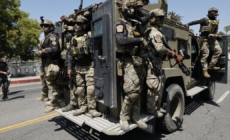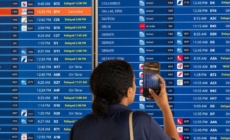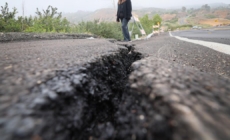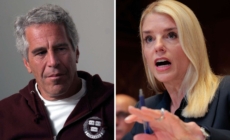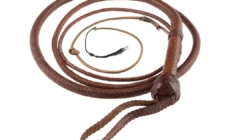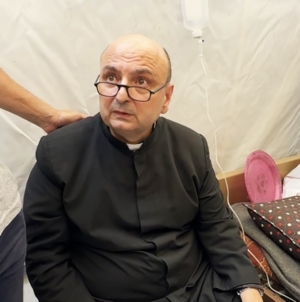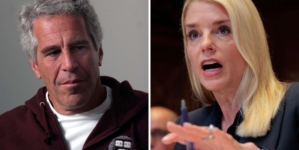-
Trump wants to hire 10,000 new ICE agents. Is that goal doable? - 9 mins ago
-
Golden Retriever Realizes He’s on Camping Trip, His Face Says It All - 17 mins ago
-
Flight cancellations are surging this summer. These airports have been hit the hardest. - 32 mins ago
-
Candace Parker on leaving Sparks: 'I didn't like who I'd become.' - 38 mins ago
-
Time to ban homes in Rancho Palos Verdes’ landslide zone? - 48 mins ago
-
North Korean defectors chase dreams to debut in K-pop boy band - 52 mins ago
-
What Epstein Grand Jury Testimony Could Include - 56 mins ago
-
Huge All-Genres Festival Valley of Arts Begins Today Near Lake Balaton - about 1 hour ago
-
Hollywood auction of “Indiana Jones” whip draws $575,000 after “Citizen Kane” Rosebud sled gets near-record $14.75 million - about 1 hour ago
-
Cheryl Miller: 'There's nobody in the WNBA like me.' - about 1 hour ago
Syria’s New Leader Won Trump’s Approval—He May Soon Be on Israel’s Hit List
Syrian Interim President Ahmad al-Sharaa may have won over U.S. President Donald Trump, but he now faces the most serious crisis of his seven-month tenure as Israel intensifies operations amid spiraling sectarian violence.
Sharaa—who seized power from longtime Syrian President Bashar al-Assad in December after a stunning 11-day offensive led by his Islamist rebel group and allied factions—stands accused by Israel of allowing his nascent security forces to perpetrate violence against the country’s Druze minority sect in the southwest.
While Sharaa and his interim government have argued that authorities were seeking to restore state rule in regions dominated by Druze militias, particularly the province of Al-Sweida, the allegations have prompted Israel to launch strikes against Syrian troops and even target prominent sites in Damascus, including the defense ministry headquarters.
The Israeli operations are the most intensive to take place in Syria since the Israel Defense Forces (IDF) launched a sweeping campaign of strikes against military targets and seized further southern territory in the immediate aftermath of Assad’s downfall. Additional Israeli ground troops have also been sent to the occupation zone.
And with Israeli Prime Minister Benjamin Netanyahu’s rhetoric hardening despite Sharaa’s calls for de-escalation, the new Syrian leader may himself become a target as have many top foes of Israel over the past 21 months of the country’s conflict with the Iran-aligned Axis of Resistance, of which Sharaa was also an ardent opponent.
“Israel has showed lately that if Israel feels that a certain leader—like [Hezbollah Secretary-General Hassan] Nasrallah, or the leaders of the military of Iran, or the leader of Hamas—is an evident threat to its national security, it will operate,” Reda Mansour, a former Israeli ambassador and currently CEO of Jethro Jews for Druze, told Newsweek.
“It’s a fact, it happened in the last two years,” Mansour added. “It wouldn’t be Israel’s first choice. Israel is probably aware that it might start an anarchy in Syria, but it depends if he started an anarchy anyway, then you have to give a chance to other leaders.”
Presidency of the Syrian Arab Republic
The Druze on the Front Lines
Mansour is among several prominent members of Israel’s Druze community who have advocated for Israeli military action in the face of reports of up to hundreds of Syrian Druze, including women and children, being slain in recent days by Bedouin tribes allegedly backed by Syrian security forces, which include a number of foreign and domestic militias.
The Druze are a religious minority composed of ethnic Arabs with a presence across Israel, Lebanon and Syria, which is home to their largest population. They have remained largely neutral throughout Syria’s 14-year civil war, with some militias allying with Assad at times, who hails from another religious minority, the Alawites, in majority-Sunni Muslim Syria.
A sizable population of Druze also live in the Golan Heights, which has been under Israeli occupation since 1967. Druze living within internationally recognized Israeli territory are by and large full Israeli citizens, while the majority of those living in the Golan Heights continue to consider themselves Syrian citizens.
Sharaa, whose family has roots in the Golan Heights, initially said little of the growing Israeli incursion and air raids in his country upon coming to power in December. Rather, he directed much of his efforts inward, vowing to respect minority rights and build a more inclusive future for the country.
Yet his commitments were quickly undermined by reports of the loosely organized security forces targeting various communities, including Alawites, Druze and Kurds.
In February, deadly clashes between Syrian forces and local militias in the largely Druze southern suburbs of Damascus prompted the first major threats from Netanyahu regarding the fate of the minority group. Violence resurfaced in April, drawing sharper warnings from Israel, and appeared to abate for a time in May, only to once again resurface in recent days.
Israeli officials have taken the opportunity to portray their country as a guardian of minority rights in the region.
“We are determined to deter the regime from harming the Druze, by ensuring the full demilitarization of the border with Syria, acting to defend our common values, and for the protection of minority groups,” Sawsan Natour-Hasoun, minister of public diplomacy at the Israeli Embassy to the United States wrote in an op-ed published by Newsweek on Thursday.
“Everyone should know that the Druze of Syria stand as the last symbol of pluralism and minority diversity in the Arab-majority region,” she added.
Sharaa meanwhile has since declared protecting the Druze a “priority” for his administration and accused Israel of “trying to drag us into war and division.”
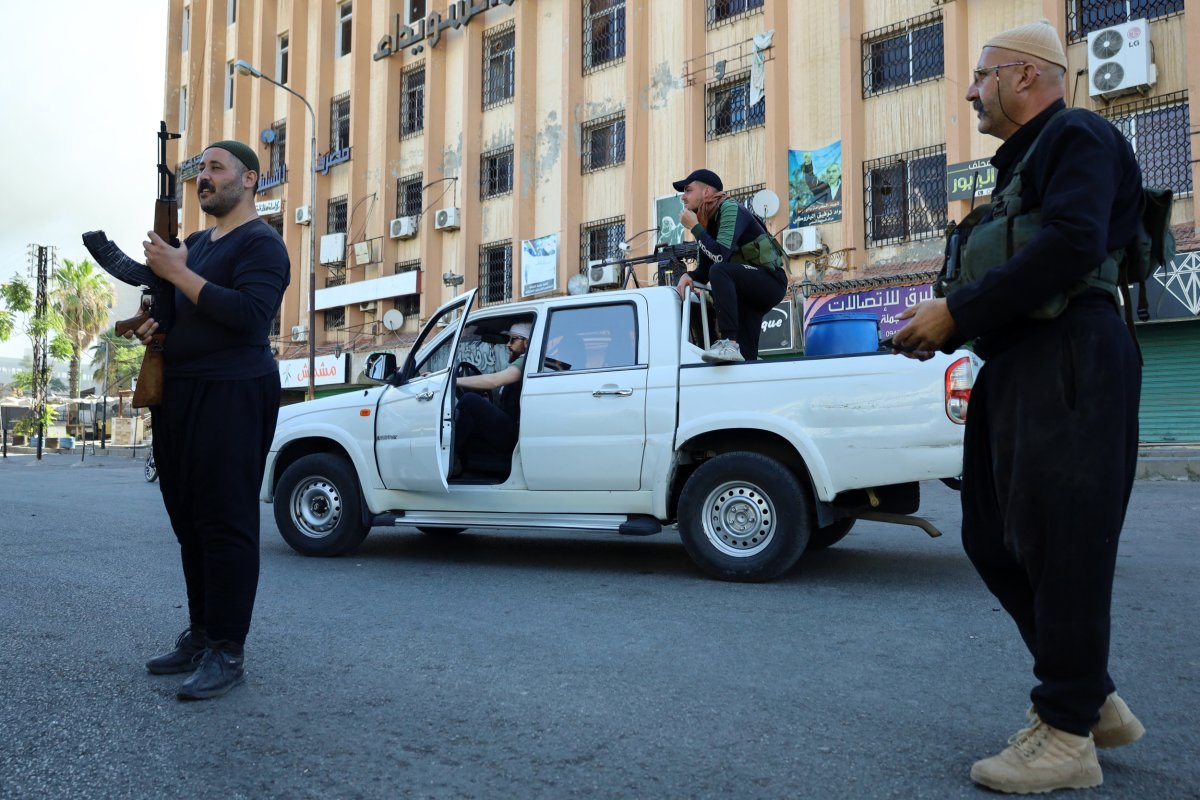
AFP/Getty Images
From Fighting US to Meeting Trump
The violence in southern Syria follows the Trump administration’s decision last week to revoke the foreign terrorist organization designation of Sharaa’s former Hayat Tahrir al-Sham faction, the latest in a series of moves that have indicated a warming in ties between Washington and Damascus.
In a brief but high-profile engagement at the Saudi Royal Palace in May, Sharaa met with Trump, whose administration had previously censured the new government for reports of targeting minorities. The U.S. leader went on to announce a lifting of sanctions against Syria that ultimately came into effect in late June.
“I think he’s very good,” Trump said of Sharaa following their meeting in May, “a young, attractive guy. Strong past. Very strong past. A fighter. But he’s got a real shot at holding it together.”
While Sharaa has publicly denounced extremist ideology in recent years, the man long better known by his nom de guerre, Abu Mohammed al-Golani, has spent much of his life in the ranks of jihadi groups.
Born in Saudi Arabia and raised in Syria, Sharaa traveled to Iraq in his early 20s to join Al-Qaeda as it launched an insurgency against U.S. troops in the wake of the 2003 invasion that toppled President Saddam Hussein. He was detained for a time by U.S. forces and rejoined Al-Qaeda in Iraq upon his release, later traveling to Syria to establish the Nusra Front, effectively operating as Al-Qaeda’s branch in the neighboring country amid the outbreak of civil war between Assad and an array of rebel factions in 2011.
Sharaa was initially allied at this time with future Islamic State militant group (ISIS) founder Abu Bakr al-Baghdadi, but in 2013 ultimately refused to align with his new group, remaining loyal to Al-Qaeda. Sharaa broke with Al-Qaeda as well in 2016 and rebranded his group several times until leading Hayat Tahrir al-Sham to victory last December.
As Sharaa began to quickly forge regional and international ties, meeting with Arab and Western leaders, some in Israel continued to express skepticism.
“I believe the world, especially the West, especially the U.S. administration, hurried up to embrace him, to give him the credit, the legitimacy without even proving anything,” Gadeer Kamal-Mreeh, a former Israeli Knesset member and currently director of Eastern Mediterranean Affairs at the Middle East Forum, told Newsweek.
“I don’t see here a reliable, liberal, educated, brave leader. I see the opposite,” Kamal-Mreeh, who is also a member of Israel’s Druze community, added. “I see a fundamentalist radical Islamist leader. I see an element of ISIS. We warned, we signaled, we said that, we predicted that since day one.”
She called on the Trump administration to apply the brakes on its embrace of Syria and reexamine its policy toward the country.
“I believe that the foreign policy in the Middle East of the new administration must hold their horses, must calculate and recalculate their steps, double check and calculate every step again and again,” Kamal-Mreeh said.
“We cannot simply call Al-Golani handsome, shake the leadership’s hands, and give them the green light to proceed and without even checking what are their plans, what they think about in the rebuilding process.”
She also predicted that Israel would likely remain active in Syria for some time, putting Sharaa himself on notice.
“Israeli drones are above Al-Sweida and above every city, including Damascus, as you saw yesterday,” Kamal-Mreeh said. “Israel is not hesitating even to attack political and leadership symbols in the palace of Golani or his offices or ministries in a warning signal that you are here crossing the red line.”
While the U.S. has continued to call on Sharaa’s administration to respect Druze rights and withdraw forces from Al-Sweida, it has also engaged in talks with both Israel and Syria in order to put an end to the fighting.
Speaking to reporters Thursday, U.S. State Department spokesperson Tammy Bruce said that “the United States did not support recent Israeli strikes” in Syria.
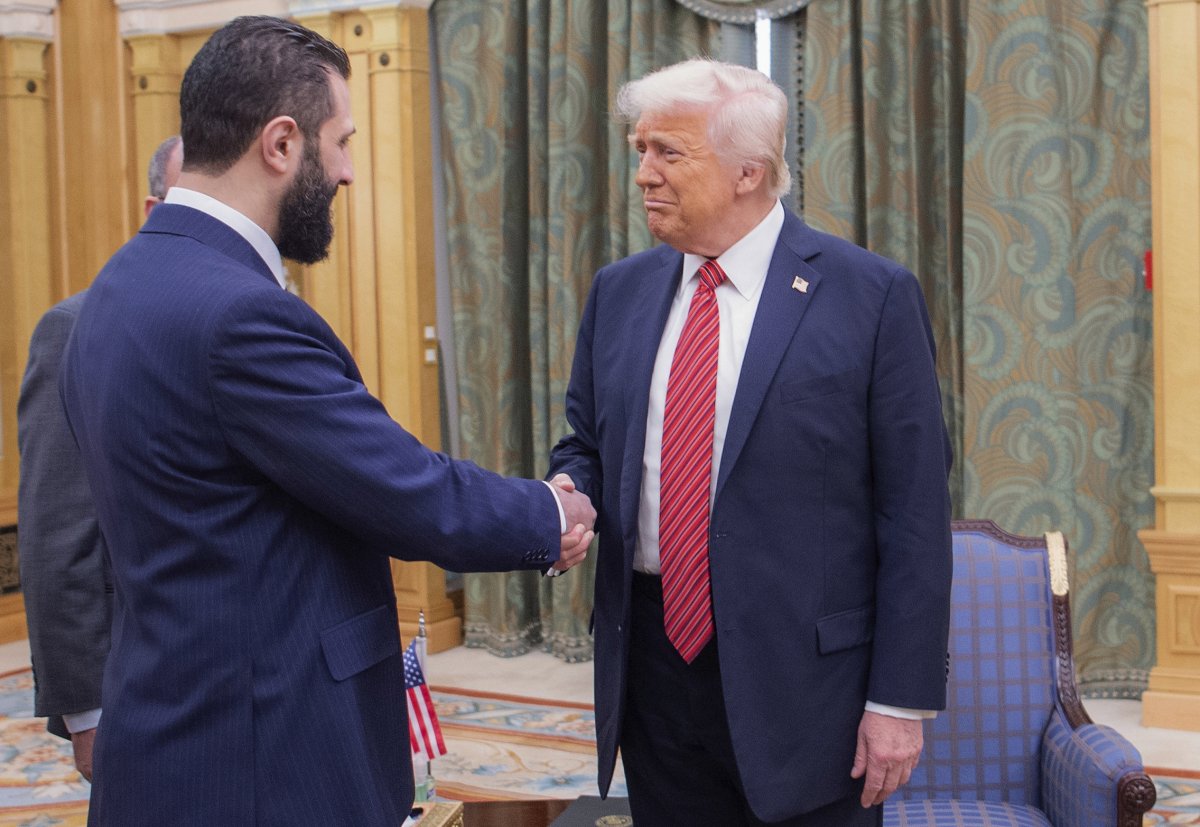
Bandar Aljaloud/Saudi Royal Palace/AP
Syria on the Brink
Many in Syria, however, have drawn the opposite lesson from recent events, which follow efforts by Sharaa to enter into talks with Israeli officials toward de-escalation and, reportedly, even the prospect of normalizing ties.
“Israel is not a country where you can expect diplomacy to play a role,” Mahmoud Toron, a Syrian politician close to the interim government, told Newsweek. “They have become completely unpredictable, and the last events have proven that.”
“So now, in the event where Syria has to find itself cornered in between resisting this lunatic behavior of Israel or keep on giving concessions they won’t give concessions for too long,” he added.
As some top Israeli officials, including National Security Minister Itamar Ben-Gvir, part of a far-right faction within Netanyahu’s ruling coalition, now openly calling for the Sharaa’s assassination, Toron referred to calls emanating from Israel for yet another regime change in Syria as being “against any form of common sense, logic and law.”
“What if tomorrow Israel decides that the government of Jordan is not friendly anymore? Does that give them the right to launch military activity and overthrow the regime in Jordan? Absolutely not,” Toron said. “It is our problem to deal with our leadership, our right, not with the interference of other states by force.”
Toron also warned that, even short of direct action against Sharaa, Israel’s behavior was already “undermining Syria’s stability” and that of its government, especially through targeting government institutions.
Toron said he was just meters away from the strike that targeted the Syrian Defense Ministry on Wednesday, and warned such actions were giving rise to calls for a more substantive response that ran the risk of devolving into greater insecurity in Syria.
“At the end of the day, the army is not yet a fully disciplined army,” Toron said. “It’s a newly formed army. It’s not easy to control the factions within this army, and these factions at the time when they believe that the president is really underperforming when it comes to certain principles, there is a very high risk that they might go offline and start eating on their own.”
“And this is going to be a problem for Israel,” he added.
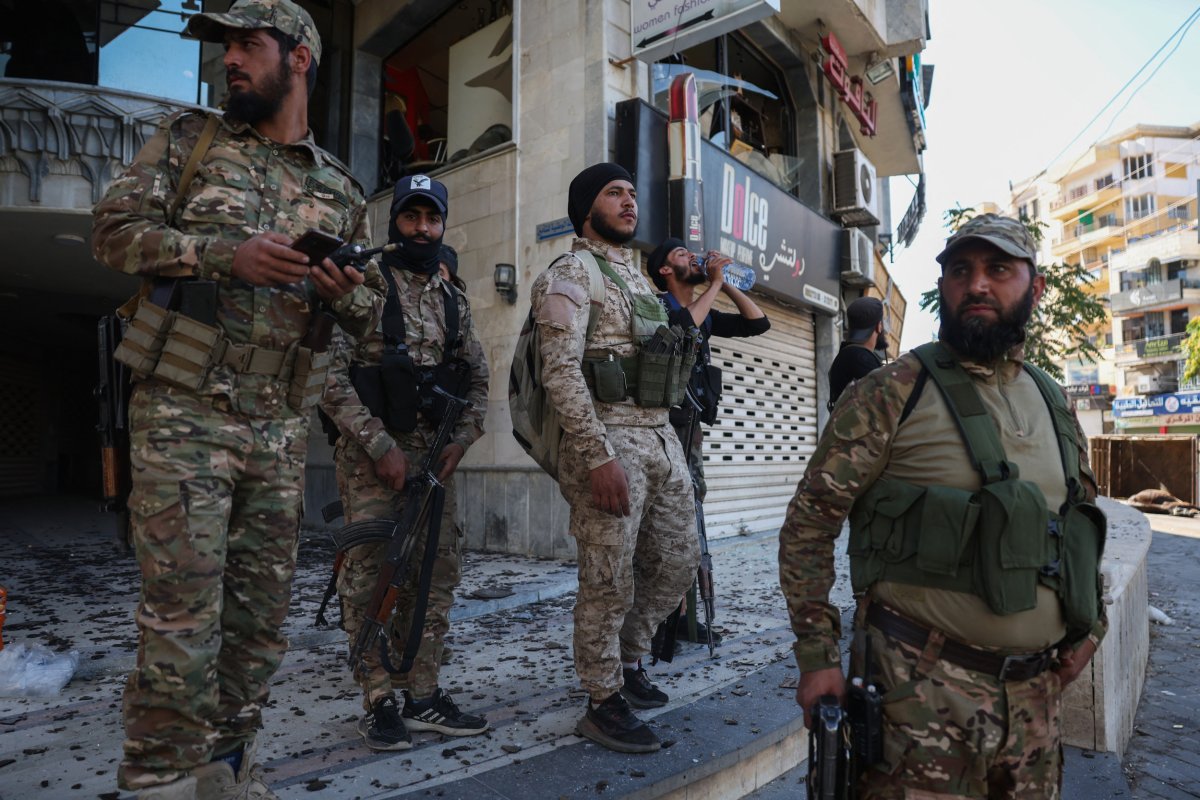
OMAR HAJ KADOUR/AFP/Getty Images
A New War Between Wars
While the latest operations mark a new chapter in Israel’s intervention in Syria, the IDF has been operating openly in the country for more than a decade. Israeli officials long referred to semi-regular raids against suspected Iran-tied targets in Syria as the “war between wars.”
This changed on October 7, 2023, when the Palestinian Hamas movement launched a massive surprise attack on Israel from another front, the Gaza Strip, sparking a full-scale war that has since engulfed much of the region, including Syria.
In addition to the pretext of protecting the Druze, Israeli officials now also justify operations in Syria by arguing that the country could not allow the buildup of hostile forces near Israel’s borders.
“Israel cannot let south Syria drift into becoming Lebanon or Gaza,” Mansour said. “We just had a very painful lesson from those places where we were very reluctant to act. We waited for too long and we paid a very dear price. So, the Israeli public mood right now is do everything you need to do to prevent another seventh of October.”
This strategy includes the enforcement of a “buffer zone” across southern Syria, from Damascus to the Golan Heights, and including Al-Sweida, as Netanyahu reiterated during video remarks on Thursday.
Mansour argued that, if Sharaa failed to make good on upholding Druze rights in the south, he could face the establishment of a de facto autonomous region, not unlike U.S.-backed Kurdish forces established in the northeast in the early years of the civil war.
“The Druze will help Israel stabilize southern Syria by having an autonomy there, and it would be, I think, good for everybody,” Mansour said. “For Israel it’s good, for the Druze it’s good, and if the government in Damascus doesn’t understand the importance of unifying the country, then it will be the price they pay for their policy.”
But the position of the Trump administration may prove crucial. In addition to withholding support for the latest Israeli strikes, the U.S. has also advocated Syrian unity and territorial integrity, a message that enforced by the White House’s role in negotiation a now-stalled deal through which its Kurdish ally, the Syrian Democratic Force, would integrate into the central government.
And while Trump remains close to Netanyahu, the U.S. leader has also established close ties with Turkish President Recep Erdogan, whom Trump credited with helping convince him to lift sanctions on Syria in May.
Erdogan railed against alleged efforts to divide Syria during a cabinet meeting on Thursday.
“We did not consent to the partition of Syria yesterday, and we absolutely will not consent to it today or tomorrow,” Erdogan said. “Those dreaming of creating a corridor between the south and the north of Syria at the cost of the country’s territorial integrity will never be able to achieve their targets.”
“We will hinder them in solidarity with our Syrian brothers and sisters,” he added. Those who go down the well with Israel’s rope will sooner or later realize they have made a grave miscalculation.”
Tonor, for his part, argued that the repercussions over growing Israeli incursion into the country was an issue not just for Syria and the region, but for the West as well.
“Are we concerned of further Israeli infiltration into Syria? Yes, we surely are, because they have not stopped,” Tonor said, “and they are literally tens of kilometers from the capital, Damascus, and that is surely a major source of concern, not just to Syria, but also to the Western world.”
“We speak with diplomats in Damascus. We speak with diplomats outside Damascus,” he added. “It is a major concern to them as well.”
Source link
